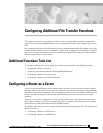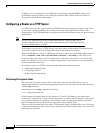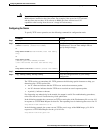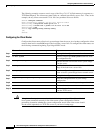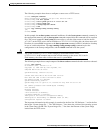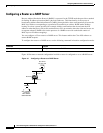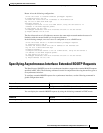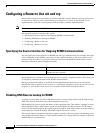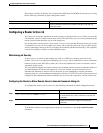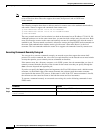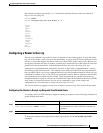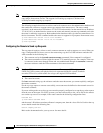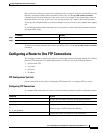
Configuring Additional File Transfer Functions
Configuring a Router as a Server
FC-245
Cisco IOS Configuration Fundamentals Configuration Guide, Release 12.1
The following example shows how to configure a router to use a TFTP server:
Client# configure terminal
Enter configuration commands, one per line. End with CTRL/Z
Client(config)# no boot system
Client(config)# boot system gs7-k.9.17 172.31.111.111
Client(config)# boot system rom
Client(config)# config-register 0x010F
Client(config)# end
Client# copy running-config startup-config
[ok]
Client# reload
In this example, the no boot system command invalidates all other boot system commands currently in
the configuration memory, and any boot system commands entered after this command will be executed
first. The second command, boot system filename address, tells the client router to look for the file
gs7-k.9.17 on the TFTP server with an IP address of 172.31.111.111. Failing this, the client router will
boot from its system ROM in response to the boot system rom command, which is included as a backup
in case of a network problem. The copy running-config startup-config command copies the
configuration to the startup configuration, and the reload command boots the system.
Caution The system software (gs7-k.9.17 in the example) to be booted from the server
(172.31.111.111 in the example) must reside in Flash memory on the server. If it is not in
Flash memory, the client router will boot the server’s system ROM.
The following example shows sample output of the show version command after the router has rebooted:
Client> show version
GS Software (GS7), Version 9.1.17
Copyright (c) 1986-1992 by cisco Systems, Inc.
Compiled Wed 21-Oct-92 22:49
System Bootstrap, Version 4.6(0.15)
Current date and time is Thu 10-22-1992 13:15:03
Boot date and time is Thu 10-22-1992 13:06:55
env-chassis uptime is 9 minutes
System restarted by power-on
System image file is “gs7-k.9.17”, booted via tftp from 172.31.111.111
RP1 (68040) processor with 16384K bytes of memory.
X.25 software.
Bridging software.
1 Switch Processor.
1 EIP controller (6 Ethernet).
6 Ethernet/IEEE 802.3 interface.
128K bytes of non-volatile configuration memory.
4096K bytes of flash memory on embedded flash (in RP1).
Configuration register is 0x010F
The important information in this example is contained in the first line “GS Software...” and in the line
that begins “System image file....” The “GS Software...” line shows the version of the operating system
in the client router’s RAM. The “System image file....” line show the filename of the system image
loaded from the TFTP server.



